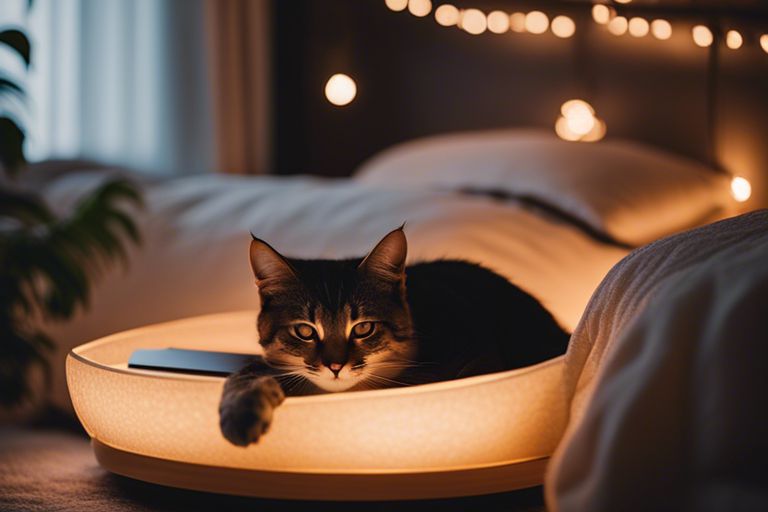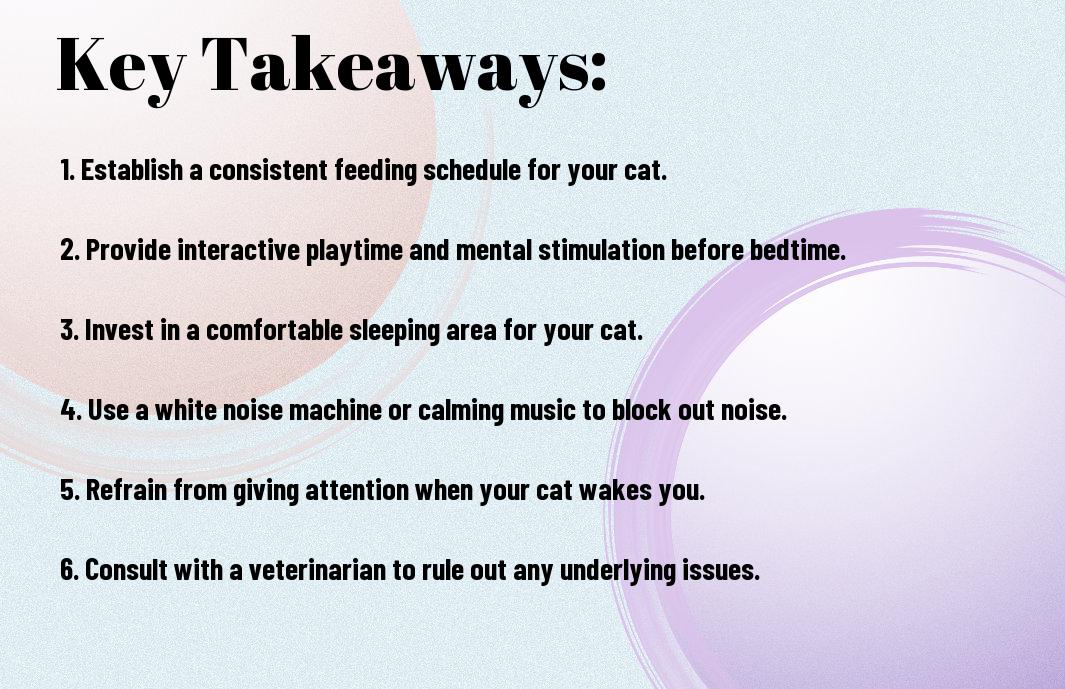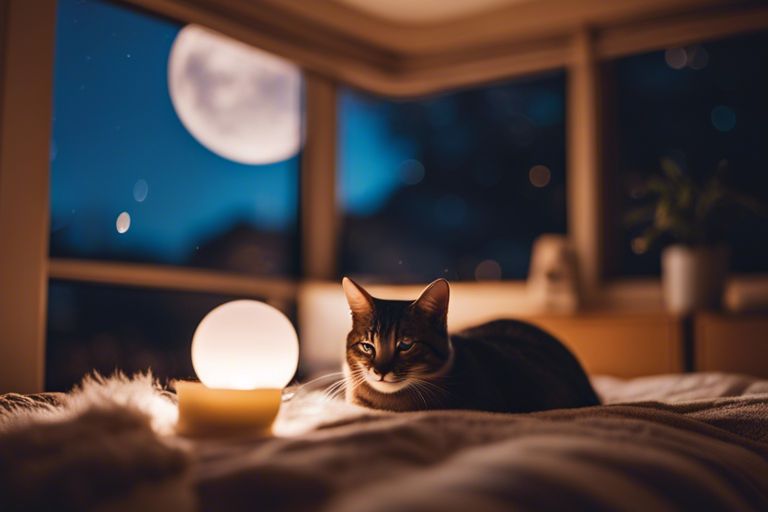Are you constantly being jolted awake by your feline companion in the wee hours of the morning? Not only can this be annoying, but it can also have negative effects on your health and overall well-being. In this blog post, we’ll discuss strategies and techniques to help you regain control of your sleep schedule and put an end to those disruptive nighttime wake-up calls. You’ll learn how to set boundaries, create a relaxing environment, and establish a consistent routine that will help your cat learn to respect your sleep time.
Key Takeaways:
- Establish a routine: Cats thrive on routine, so try to feed, play, and interact with your cat at the same times each day to help regulate their sleep cycle.
- Create a comfortable sleeping environment: Provide your cat with a cozy bed and toys to keep them entertained at night, reducing the likelihood of them waking you up.
- Avoid reinforcing negative behavior: If your cat wakes you up for attention, avoid giving in to their demands as this can reinforce the behavior. Instead, wait until they are quiet before giving them attention.
- Provide mental and physical stimulation: Engage your cat in stimulating activities during the day to tire them out, making them more likely to sleep through the night.
- Consult with a veterinarian: If your cat’s nighttime behavior persists, consult with a veterinarian to rule out any underlying health issues and to explore potential solutions.



Establishing a Routine
Obviously, cats are creatures of habit, and establishing a consistent routine can help regulate their behavior, particularly at night. By providing structure and predictability, you can help your cat adjust to a more suitable sleep pattern that aligns with your own.
Feeding schedules and their impact
When it comes to feeding your cat, a regular schedule can have a significant impact on their nighttime behavior. Try to feed your cat at the same times each day, preferably in the morning and evening. This will help regulate their hunger levels and can prevent them from waking you up in the middle of the night demanding food. Additionally, avoid free-feeding, as it can lead to irregular eating patterns and make it harder to control when your cat is hungry.
Play and activity before bedtime
Engaging your cat in physical and mental activity before bedtime can help exhaust their energy and encourage them to sleep through the night. Interactive play sessions or using puzzle toys to stimulate their mind can help tire them out, making them more likely to rest when you do. Try to incorporate a playtime routine into your evening schedule to signal to your cat that sleep time is approaching.
Creating an Ideal Sleep Environment
Lastly, to prevent your cat from waking you up in the middle of the night, you should focus on creating an ideal sleep environment for both you and your feline companion. This will help to ensure that your cat feels comfortable and secure, reducing the likelihood that they will disrupt your sleep.
The role of a comfortable cat bed
Providing your cat with a comfortable and inviting bed can help to encourage them to stay in one place during the night. Choose a bed that is appropriately sized for your cat and place it in a quiet, secluded area of your home. Cats enjoy having their own space, and providing them with a cozy bed can help them feel secure and settled during the night.
Reducing night-time stimuli
It’s important to minimize any potential sources of disturbance that could cause your cat to become active during the night. This includes things like bright lights, loud noises, and tempting toys. Try to create a calm and peaceful environment in the hours leading up to bedtime, and avoid engaging your cat in play or feeding right before you go to sleep. By reducing these night-time stimuli, you can help to prevent your cat from waking you up during the night.
Behavioral Interventions
Despite your best efforts, your cat may continue to wake you up in the middle of the night. In such cases, it may be necessary to implement behavioral interventions to address this issue. Behavioral interventions involve modifying your cat’s behavior through training and management techniques.
Training your cat with positive reinforcement
If your cat is waking you up at night, it may be helpful to train them to associate nighttime with quiet and calm behavior. You can do this by using positive reinforcement, such as treats and praise, to reward your cat for remaining quiet during the night. Encourage them to use their scratching post or play with toys during the day to help tire them out and reduce nighttime activity. When your cat behaves calmly at night, be sure to reinforce this behavior with rewards to encourage them to continue doing so.
Managing nocturnal activity without punishment
It’s important to avoid using punishment to address your cat’s nighttime behavior. Punishing your cat for waking you up can lead to fear and anxiety, which may exacerbate the problem. Instead, focus on managing their nocturnal activity in positive ways. Provide a stimulating environment during the day, including interactive toys, climbing structures, and scratching posts, to help burn off excess energy. Additionally, establish a consistent nighttime routine that includes playtime before bed to encourage your cat to sleep through the night. If your cat does wake you, resist the urge to scold them. Instead, gently redirect their behavior and encourage them to settle down without making a fuss.
Consultation and Professional Advice
However, if you have tried different methods and your cat’s behavior still doesn’t improve, it might be time to seek professional advice. Consulting a vet or a professional cat behaviorist can provide you with the expertise and guidance you need to address the issue effectively.
When to consult a vet
If your cat’s nighttime behavior persists despite your efforts to address it, it may be due to an underlying medical issue. It’s important to consult a vet to rule out any potential health problems that could be causing your cat’s disruptive behavior. This is especially crucial if your cat’s nighttime behaviors are accompanied by other concerning symptoms such as changes in eating or drinking habits, lethargy, or excessive vocalization. Your vet can conduct a thorough physical examination and recommend any necessary diagnostic tests to identify and address any health issues.
Exploring behavioral therapy and professional trainers
For more complex behavioral issues, a professional cat behaviorist or trainer can provide valuable insight and guidance. These experts are trained to identify the underlying causes of your cat’s disruptive behavior and develop effective behavior modification plans. They can work with you to implement positive reinforcement techniques, environmental modifications, and other strategies to address your cat’s nighttime disturbances. Additionally, they can provide you with the knowledge and tools to improve your relationship with your cat and create a more harmonious living environment for both of you.
FAQ
Q: Why does my cat wake me up in the middle of the night?
A: Cats are naturally more active during the night and may have a tendency to want to play, hunt, or seek attention during these hours. Additionally, hunger, discomfort, or a disrupted sleep schedule can also contribute to your cat’s nighttime activities.
Q: How can I train my cat to stop waking me up at night?
A: Establishing a consistent feeding and playtime schedule can help regulate your cat’s behavior. Providing enrichment activities and toys to keep your cat entertained during the night can also help. Avoid reinforcing the behavior by responding to your cat’s demands for attention during the night.
Q: Are there any products or methods that can help my cat sleep through the night?
A: Consider providing a comfortable sleeping area for your cat away from your bedroom to minimize disturbances. Products such as pheromone diffusers or calming collars can help reduce your cat’s anxiety and promote a sense of security. In some cases, consulting with a veterinarian to rule out any underlying health issues may be necessary.

Jayley, a devoted cat enthusiast, also writer for other cat blog as well. She aims to dedicated to providing comprehensive information, insights, and advice on everything you’d ever want to know about our whiskered companions.
